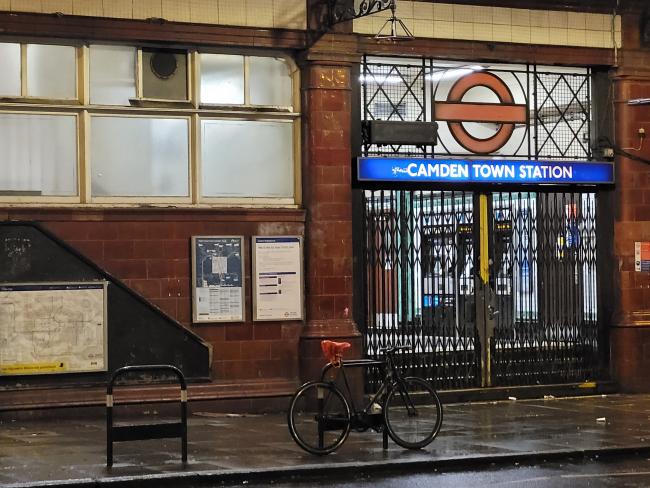9 June 2022

Camden Town station closed on 6 June. Photo Workers.
On Monday 6 June London Underground was shut down by ongoing disputes with tube workers. Around 4,000 workers, station and revenue control staff, were on strike against job cuts and attacks on pensions.
Without them, services could not run and trains stayed in depots. Rail union RMT reported a large number of strikers at the picket lines despite heavy rain on the day.
Negative
RMT members say they face enormous negative changes to both pensions and working conditions, as well as the loss of 600 station staff under plans announced by Transport for London (TfL).
‘The power to take effective action can’t be underestimated.’
RMT general secretary Mick Lynch commended the tube strikers “for taking strike action in defence of their pensions and jobs” and said that their power to take effective action can’t be underestimated.
The employer denies there will be job losses. Andy Lord, TfL’s chief operating officer, said: “No changes have been proposed to pensions and nobody has or will lose their job as a result of the proposals we have set out.” That’s not how workers see the situation.
Cost saving
As part of previous funding agreements, the government told TfL to achieve financial sustainability on their network by April 2023. TfL has proposed not recruiting into around 500 to 600 posts as a cost saving measure since they became “vacant”.
Lord also said that RMT should be working with TfL to find a resolution, which rather undermines his claim that there is no problem and ignores events leading up to the strike.
No authority
RMT said it was willing to have talks and negotiations. But London Underground Limited (LUL) had no interest in changing its course of action. LUL said it was not prepared to make compromises and in any case, it did not have the authority to do so.
On the Wednesday before the strike was due, Lynch demanded a meeting with Sadiq Khan, mayor of London, for negotiations and urgent talks “to sort this mess out”. Khan has power to resolve the dispute, management representatives without authority to negotiate do not.
Cost of living
RMT’s position remains that changes to conditions should be negotiated, not imposed and that its members deserve a pay increase that addresses the rising cost of living. TfL workers believed that their only option was to take strike action in the face of “intransigence and stubbornness” from Khan, LUL and TfL.
Lynch urged Khan, “...to stand up to the Tory government who are cutting funding to TfL rather than try to pick a fight with tube workers.” TfL now says it is willing to talk to RMT to avoid further strikes but suggested they both lobby government, which it blames for the threatened job cuts and pension changes.
Blame
For its part, the government is blaming Khan and TfL. A Department for Transport spokesman explained: “It is disappointing and unfair of the Mayor to put the blame for these strikes on the Government rather than take responsibility and fulfil his promise of making TfL financially stable – especially as it was his own advisory panel who recommended pension reform.”
Until Sunday 10 July, RMT members will refuse overtime work as an action short of strike, which will result in station closures at short notice. And as RMT is sticking to its guns about the need for a “just settlement”, further strikes can’t be ruled out either. In addition, RMT and Unite members are expected to join the national rail strikes called for 21, 23 and 25 June.
Toxic
TfL is glossing over other issues affecting the tube and transport in London and the poor relationship with its workforce, which RMT has described at times as “toxic”.
The long running dispute over drivers’ rotas for the Night Tube shows no sign of resolution. Strikes on the Central, Jubilee and Victoria lines every Friday and Saturday night are due to end on 19 June.
RMT had originally called a strike at Euston and Green Park stations for 3 June over long term bullying by management, which also refused to deal with local reps. That strike was suspended after “significant progress” in talks with LUL. But then the wider dispute over the LUL plan resulted in the action on 6 June. The bullying issue has not gone away, and is currently under joint review.
And on the buses, Unite is challenging TfL plans announced on 1 June for cuts to inner London services. Again government funding is an issue. Unite general secretary Sharon Graham said the union “…will not allow our bus members to carry the can for a funding row between TfL and the government.” The funding crisis is not of their making.
